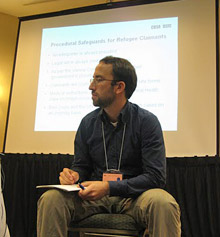Canadian Council for Refugees and Sojourn House

Louis Century coordinates a workshop at the CCR's Spring Consultation |
When a foreign national arrives at the Canadian border seeking asylum, he or she is interviewed by an officer of the Canada Border Services Agency. This officer is charged with deciding whether or not the individual is eligible to enter Canada and make a refugee claim. If ineligible, the individual may be sent home. My Donner Fellowship this summer, working for the Canadian Council for Refugees (CCR) and Sojourn House, a Toronto refugee shelter, has been to investigate the experiences of refugee claimants at port-of-entry interviews. The culmination of my work will be a CCR report.
I have interviewed several dozen refugee claimants about their experiences at the border. This has been a unique opportunity to conduct primary research. Some claimants are grateful for the welcoming reception they received. Others dread the memory of their arrival at the border, where they were intimidated by armed officers, threatened with deportation or reminded of the harsh treatment from which they so recently fled. Still others are burdened with the lingering consequences of poor translation or sloppy interview notes, which obstruct their refugee claim years later.
My research has also brought me in contact with refugee-serving practitioners, whom I have questioned about their perspectives on port-of-entry issues. I have interviewed nearly 40 refugee lawyers, counselors and caseworkers from both sides of the Canada-US border. The legal professionals I interview come from such varied organizations as the Canadian Bar Association, Red Cross and numerous small practices. Back in June, I organized a workshop at the Canadian Council for Refugees' biannual conference, in which I presented on port-of-entry issues to a room full of refugee advocates. Recently, I visited the Fort Erie-Buffalo border and received a tour of the refugee intake centre there.
The Donner Fellowship made all of this possible. The flexibility of the program allowed me to contact organizations of my choosing, and propose a mutually developed work plan. For CCR and Sojourn House, this research would not have been undertaken without external funding. In the past, CCR has had trouble advocating on port-of-entry concerns because claimants generally refuse consent for formal complaints; this anonymous report will serve as an alternative advocacy tool. For my part, I have been offered invaluable exposure to a fascinating line of work. I am very thankful.

